Translation Notes
Thank you for checking out the Danganronpa Togami Fan Translation! This page exists to document how I translated the series of light novels. I won't talk about every little thing, but I will talk abotu stuff I think was important or otherwise interesting. Of course, since the translation isn't complete, expect this page to update a lot. Also note that there may be some spoilers for the chapters I have translated, so please read those first.
How the Translation Was Done
I've been trying my best to learn bits of Japanese for a bit now, however I am far from an expert. With this handicap, it's pretty hard to translate a novel. However I decided to take a similar approach to the Danganronpa Kirigiri translation. By cross checking machine translation services (such as Google Translate, DeepL, etc.), summaries, and the wiki along with doing research and learning more Japanese on the way, I believe I was able to create a translation that is pretty accurate. There may be some errors, but I think it's in a state where it is close enough to the original version. Also, despite relying heavily on machine translation, each word is written by me so that way I can avoid sounding robotic or having weird sentence flow. Once again, I must reiterate, this fan translation is most likely not perfect. If you notice any errors or any issues, please let me know.
Transliteration vs. Localization
An important distinction I had to make early on is whether this would be a direct translation or a localization. A direct translation leaves everything as is, but risks alienating the reader or losing creative writing or wordplay. Meanwhile a localization does its best to ammend these things with the consequences of having to change some things. I decided that overall, I'd try to translate it as closely as possible, but still ultimately did some localization. This means everything means the same thing, but I may attempt to make a reference more clear ot just use a more relatable reference, change a nickname to be more creative in English, or just reword things to flow better, but ultimately everything should still mean the same thing.
Formatting
When formatting the novel, I wanted to find a font that would match the "sophisticated" look and feel of the original. I eventually landed on the font Stoke, it's another serif font but it doesn't look too basic like Times New Roman or many other serif fonts do. For the Borges entries, I wanted to use a different font so that way it doesn't get confused with the other stuff happening, so for that I used the font Share Tech Mono due to it's "computer" feel. I also remember reading somewhere that in the original Japanese version that the Borges entries use a different font there as well, but I haven't been able to confirm that since I'm not the best at recognizing Japanese fonts. Even if it wasn't like that in the original Japanese version, I think this is a fine change that doesn't effect the novel and makes it easier for English readers.
The Text
With the novel being translated into English, I decided to make an English logo for it. Initially I based the logo on the logo of the games, but it looked pretty sloppy and I didn't really like it. Eventually I redid the logo in the style of the old logo that you'd see on early Danganronpa mangas localized by Dark Horse.
|
English Logo Version 1 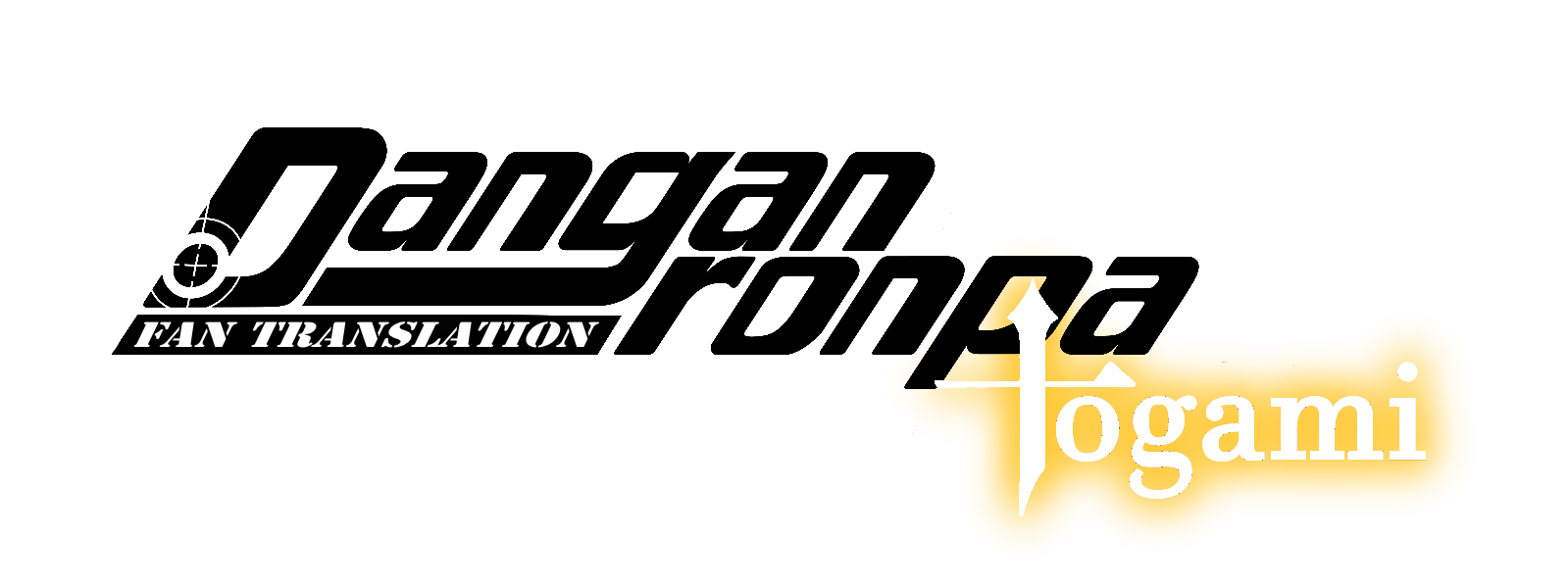 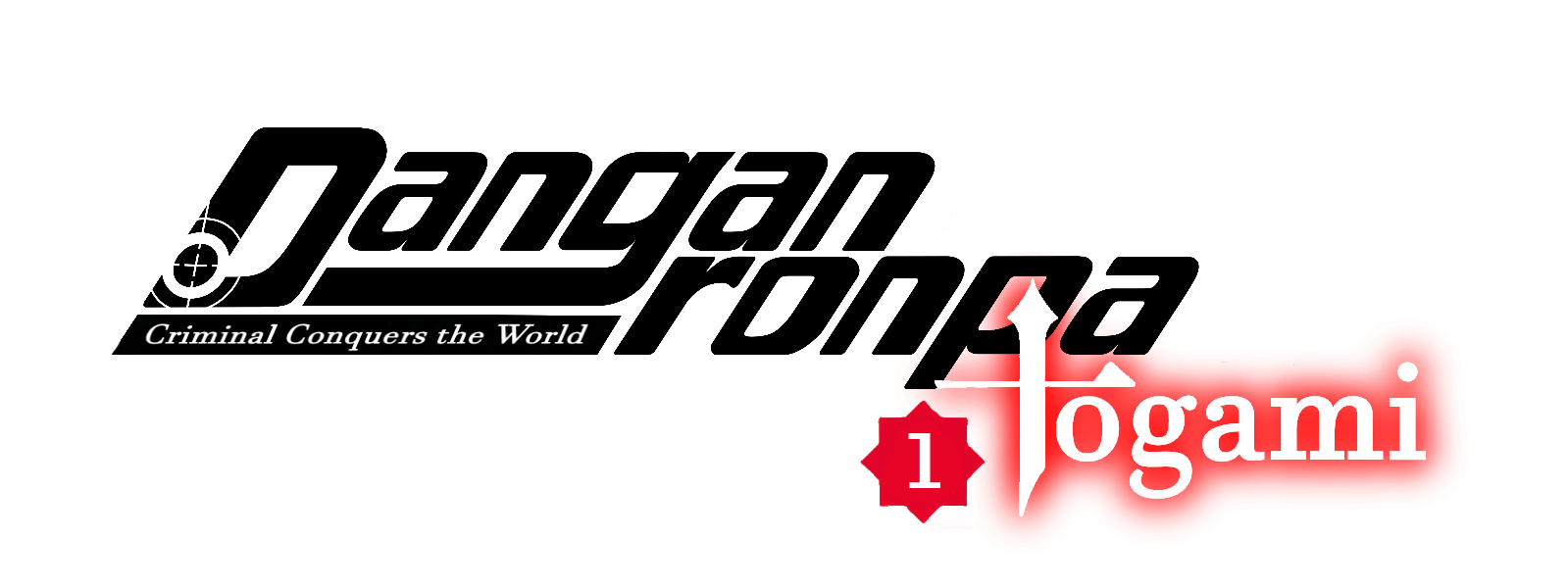 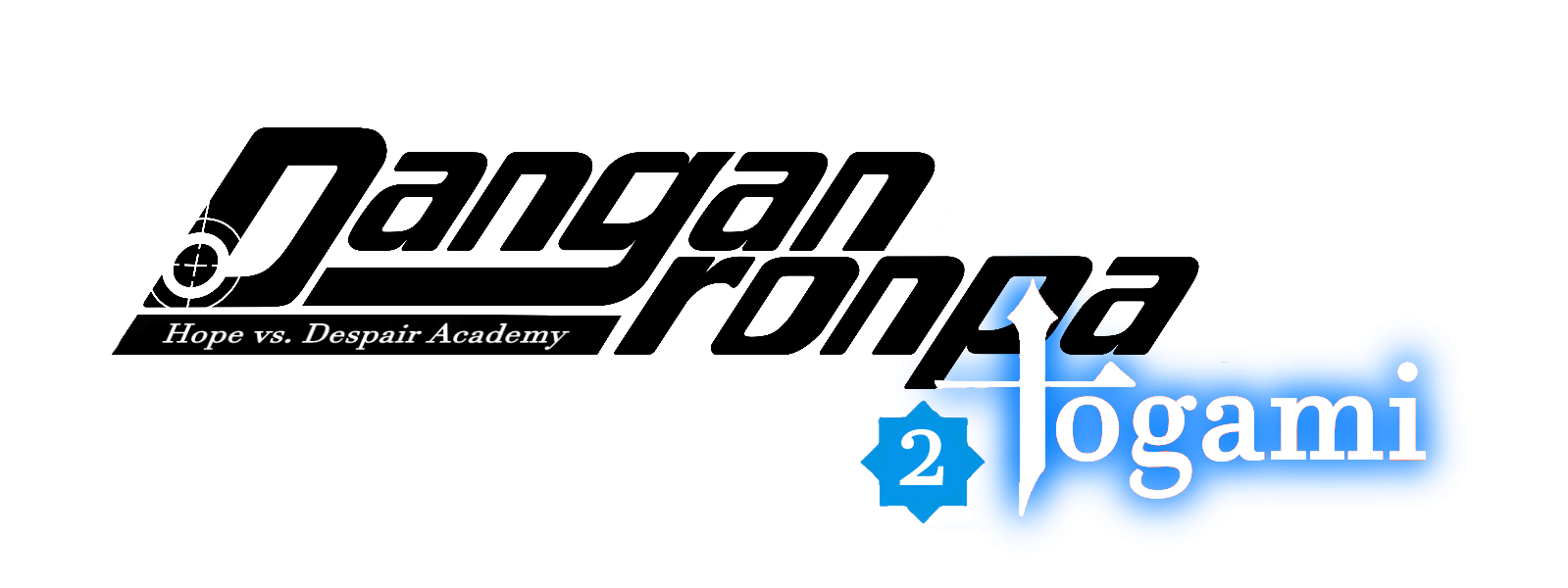 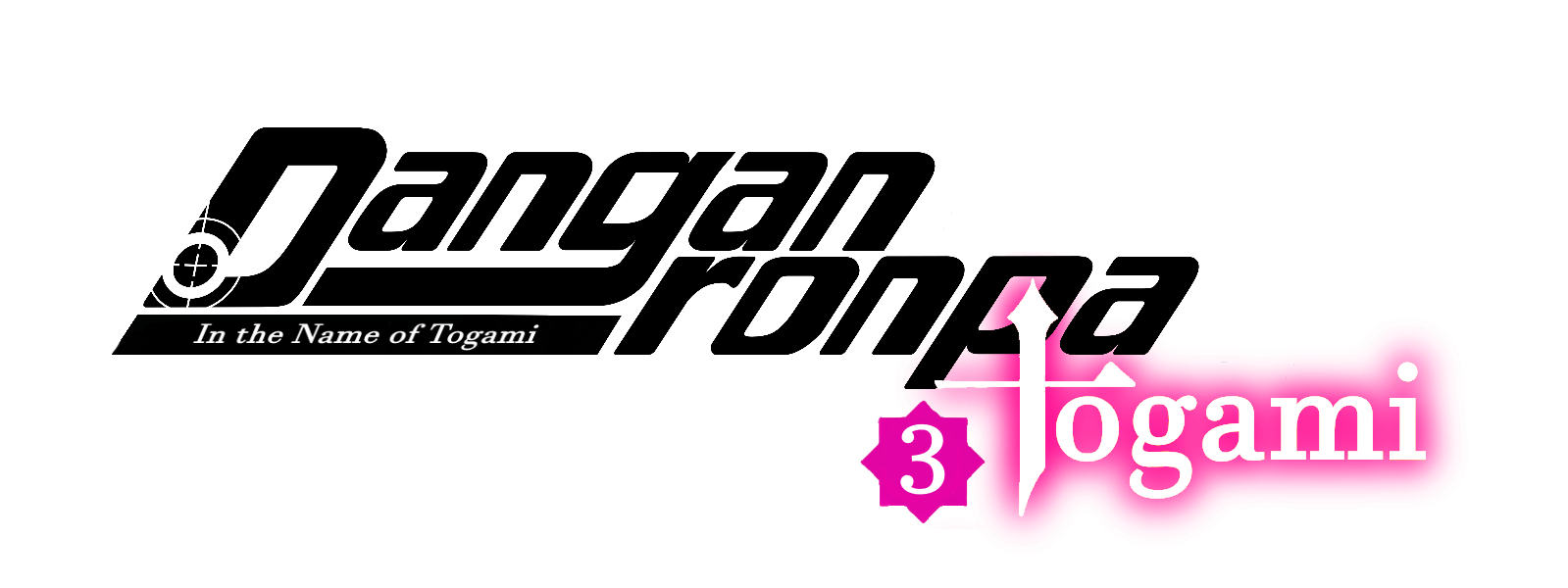
|
English Logo Version 2    
|
Also along with editing all of the Japanese text in the novel (such as in the table of contents or the chapter title pages, I went and edited the new English logos into the covers. Unfortunately, I couldn't find any "logo-less" variants, so you'll have to bear with my third-rate editing.
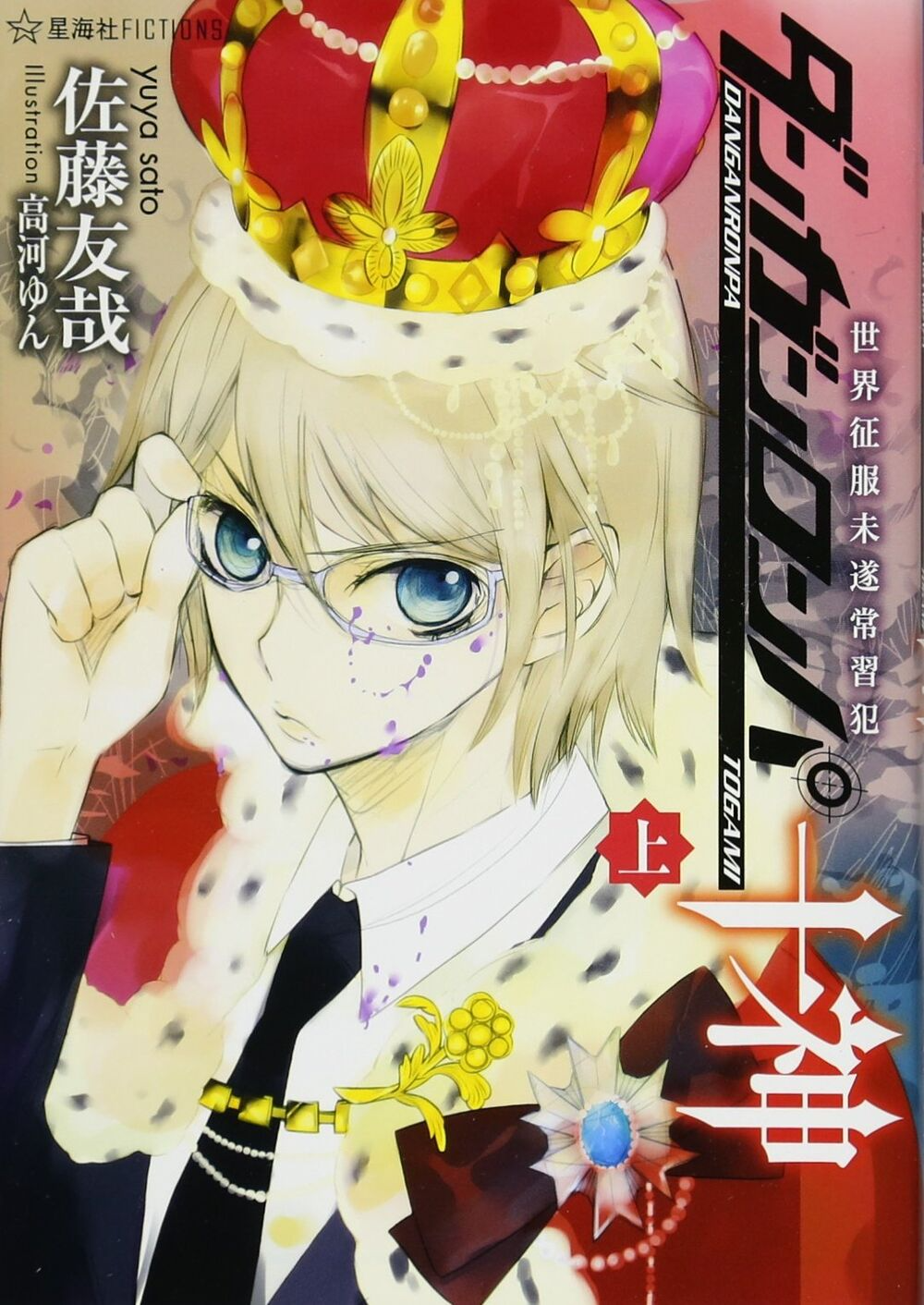
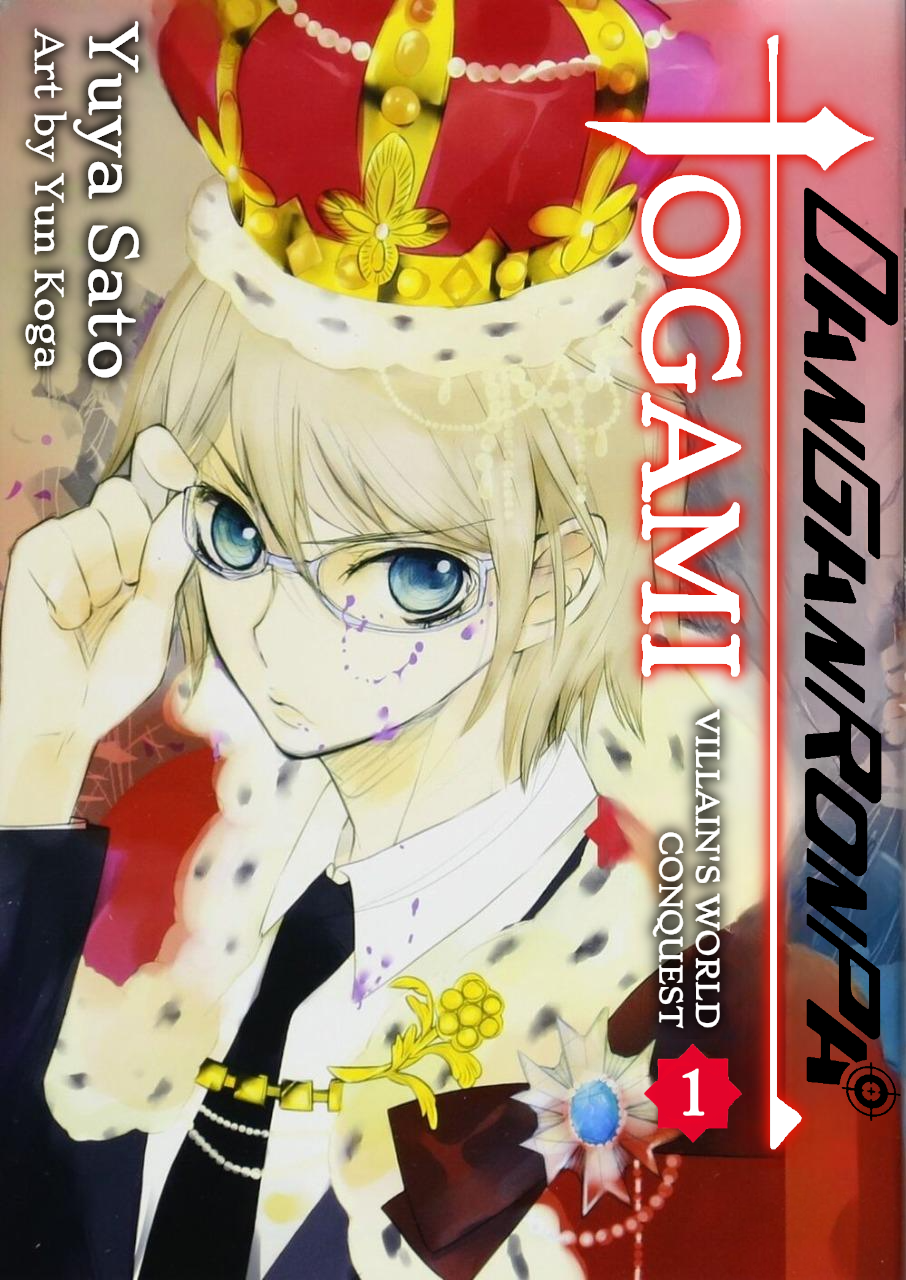




By the Dignity of the Togami Name!
A phrase you'll hear frequently throughout Danganronpa Togami is "by the dignity of the Togami name." When I first started this project, I initially translated it as "in the name of Togami," but it came to my attention during my rewatch of Danganronpa 3 that this phrase is actually used in episode 7 of Future Arc. The dub (as mixed as its quality is) translated it as "by the dignity of the Togami name," so I figured I'd reference that since it's the coolest sounding translation of this phrase.
The Ultimate Dilemma
As pretty much every Danganronpa fan knows, the Danganronpa games localize the phrase "Super High School Level" (abbreviated as "SHSL") as "Ultimate." Along with this, some talents are changed. Like for example, Byakuya goes from the "SHSL Heir" to the "Ultimate Affluent Progeny." When translating, I was unsure whether I should use the terminology from the games or stick close to the Japanese terminology, but ultimately I ended up sticking with "SHSL" for a few reasons. For one, I believe the "Ultimate" talents deviate too far from the original "SHSL" talents, often over professionalizing them and missing the original intent. Also, there are cases where official english translations use "SHSL," such as with the dubs for the animes. And honestly, I just think it sounds better.
Dis-honorifics
Another issue I faced, albeit a more minor one, was the use of honorifics. The official games ditch honorifics, often replacing them with equivalents. I originally wanted to keep the honorifics, but they felt pretty unnatural, so I ended up getting rid of them and doing the same thing as the official games.
Forbidden Notes
Early on in my translation, I used a lot of translation notes. Since Danganronpa Togami is pretty heavy on wordplay and references that most English audiences wouldn't get, it was kind of hard to avoid them. But eventually I came to the realization that using translation notes was really no different from just explaining a joke or reading a summary, which was the exact oppossite of what I was trying to achieve. I wanted to recreate the experience of Danganronpa Togami in English, and I'm pretty sure Yuya Sato didn't intend for people to have to look at notes in order to understand what he wrote every two seconds.
This came with the issue of "How do I properly update the text to be more understandable without changing it?" My solution was just to expand on what was written, instead of replacing it. For example, early in the first chapter Blue Ink makes a reference to the black ships from the Perry Expedition, however doesn't directly mention the Perry Expedition. All I did to update this text to make it easier to understand was add "during the Perry Expedition" to the end of it. Another example of expanding on what was written is when Sonia references Harenchi Gakuen. Many English readers would probably have no clue what it is, so I changed the line "You look like you came out of Harenchi Gakuen!" to "You look like you came out of the erotic manga, Harenchi Gakuen!" With just a simple change like that, you'll be able to understand what Sonia is saying without having to know exactly what Harenchi Gakuen is. This act of "expanding, not replacing" can be seen all over the fan translation.
The Title of the Biography is...
Speaking of "expanding, not replacing." One of the hardest things for me to translate was Byakuya's biography, Byakuyako. The title Byakuyako is a pun, it means both "Journey Under the Midnight Sun," and since Byakuya's name means "Midnight Sun" it can also be read as "Byakuya's Journey." This is obviously completely lost in translation, so it was pretty difficult to figure out what to do here. On the wiki and seemingly most translations, they refer to the biography as "Journey Under the Midnight Sun" and simply just leave a translation note. Obviously, as I already mentioned, I didn't want to use translation notes. In that case, if I just used "Journey Under the Midnight Sun" then I would end up losing the connection to "Byakuya's Journey." If I called it "Byakuya's Journey," I'd lose the intentional connection to "Journey Under the Midnight Sun," which Blue Ink mentions isn't a ripoff of a book of the same name. So what do I do?
In the end, I ended up just sticking to the original untranslated name of "Byakuyako." However, I made sure to add a little extra line saying 'it means both “Byakuya’s Journey' and 'Journey Under the Midnight Sun.'" Not only does this keep the double meaning, it also keeps the reference to "Journey Under the Midnight Sun" and explains why Blue Ink would say it isn't a ripoff. Once again following my principle of "expanding, not replacing." Hopefully this works well enough, I honestly had no other ideas.
Ishida vs. Wishnov
In regards to the issue of there being two Byakuyas with the same voice, Sonia breaks the fourth wall and says "Or do you think there are multiple Akira Ishidas?” This is because Akira Ishida is Byakuya's Japanese voice actor. However, since this is in English, I decided to reference his English voice actor instead and change the line to "Or do you think there are multiple Jason Wishnovs?” This is an example of how some of this translation leans a bit into localization territory.
Eeeeeeeeeeeeat thiiiiiiiiiiiiiiiiiiiis!
When Sonia's troops are attacked, Taeko shouts "itadakimasu." This phrase is used before eating a meal as a sign of thanks, often translated as "thank you for the food" or "let's eat." I figured saying "Thaaaaaaaaaaaank yoooooooooooooou!" didn't really hit as hard or make much sense, so I updated the line to say "Eeeeeeeeeeeeat thiiiiiiiiiiiiiiiiiiiis!" instead, keeping the reference to food and fitting the scenario.
Corporation or Conglomerate
With all this talk of "Togami Zaibatsu" this or "Ketoin Zaibatsu" that, it begged the question how I was going to translate "zaibatsu." I didn't know if I was going to go for "corporation" or "conglomerate." However, since the games just used "corporation," I figured I would just use that too. And then I realized this really didn't matter than much because they basically mean the same thing anyways and I'm just overthinking.
Fun Little Nicknames
In the novel, Hiroyuki affectionately refers to Byakuya as "little master" and Byakuya insultingly refers to Hiroyuki as "third-rate conglomerate." I wanted to try to emphasize this playful dynamic, so I initially went with "Master Youngster" and "third-rate corpo," but "Master Youngster" just didn't really sound good and Byakuya calling Hiroyuki a corpo makes it sound more like he's insulting him for being a part of a corporation instead of being third rate. In the end, I settled on "li'l boss" and "wannabe mogul." "Li'l boss" emphasizes the teasing and playful nature of the nickame, meanwhile "wannabe mogul" maintains the original meaning of insulting him for not being on the same level as him while also sounding more creative.
Temptation
In Chapter 1, Hiroyuki jokingly asks Byakuya if he wants him to heat up some rice balls for him. You have no idea how badly I wanted to reference the Pokemon dub and replace rice balls with jelly filled donuts. This would become an important learning experience for me, as I suddenly remembered my goal. I musn't deviate from the author's path, even if it would be the funniest thing ever. I let go of my dreams of the jelly filled donut, and moved on to become a better person. This serves as an important life lesson to never give into temptation and to never stray from the right path, even if it's difficult. Thank you Danganronpa Togami for teaching me this important lesson.
Japanese Grammar Struggles
At certain points, there are times they will make a joke about Japanese spellings of things that don't necessarily translate well into English. Like when Hiroyuki asks which spelling of "ecchi" is sexier, or when Toko gets the Japanese word for "pleased" confused. These thankfully aren't too hard to localize, but I figured it was worth mentioning. In the case of Hiroyuki's comment, I changed it to “By the way, which one excites you more, the word ‘lewd’ or the word ‘ecchi?’” And for Toko's comment, I had her get the words "pleasured" and "pleased" mixed up. There's plenty of examples of this all throughout the novel trilogy, but I adapted them to the best of my ability.
200 Characters or Less
Late into Chapter 1, Byakuya asks the Toko to explain the situation into 200 characters or less. Of course, this is a lot harder to do In English, but I took up the challenge to translate Toko's response in 200 characters or less anyways!
Direct translation (452 characters):
“1:00 AM Japan time. Immediately after the World Domination Declaration in Prague, riots broke out in the country. Sensing danger and wanting to obtain information, I fled to Hope's Peak Academy, where I met up with Junko Enoshima. I have not seen any other students or teachers. Traffic restrictions were put in place to prevent congestion, so the phone lines were down, and I was using the school's satellite phone, which got me through. That's all.”
My version (197 characters):
“1 AM in Japan. Riots broke out after the declaration in Prague. Suspicious, I ran to Hope’s Peak and met Enoshima, but no one else. With phone lines down due to traffic, I used the satellite phone.”
Bokukko?
In Japanese, a bokukko is a girl who uses the pronoun "boku" for themselves, a pronoun typically used by boys and young men. In Chapter 2, the Mole refers to the Keeper as a bokukko. Of course, as you expected, this is difficult to translate. Most just translate it as a tomboy, but that doesn't always work. However, I feel using tomboy here works fine, so I went with that.
Jack x2
In the English localization for the Danganronpa games, Genocider Syo is changed to Genocide Jack. This has its own issues in that game that I won't get into now, but it also creates another issue. There is a separate, unrelated serial killer named Jack the Stabber (or Stabbing Jack). Obviously, having two serial killers named Jack would be kinda silly, so I stuck with the original name, Genocider Syo. Also it sounds better and I would have just used it anyway (lol).
The Greatest Mystory
No, "mystory" isn't a typo. In the novel, the Mystory Research Club pronounce the word "mystery" in a funny way, for aesthetics of course. Finding a good way to adapt this was kinda tricky, I know that the Spinoff Wiki uses "myst'ry." Eventually, I thought of how in Dexter's Laboratory, Dexter pronounces the word "Laboratory" in a funny way, so I did something with "mystory." Plus, it has the new added benefit of feeling like a combination of "mystery" and "story," which makes sense because it's used to refer to mystery novels.
What is a Triple Threat Match?
The title of Chapter 3 directly translates to "Tomoesen." This is a sumo term for a play-off involving three wrestlers. Of course, this isn't something that many would get right away due to it not being an English word, so I titled it Triple Threat Match. Right away, this makes it clear even if you don't know what exactly it's referencing, but also it's a WWE wrestingling term for a match with three people in it.
Sonia's Stupid Dumb Stupid Poem
When Sonia appears in her art truck, there's a poem written on it. I wanted the poem to feel like an actual poem and not a translation of a poem, so I went out of my way to reword and rephrase it to be like a Haikyu. This took like 2 hours to do.
Decoration Trucks
In Chapter 3, Sonia and Kazuichi arrive in a decoration truck. The original text shortened it to "Decotora," but obviously that's not an English phrase, so I referred to it as an art truck instead, which is an alternate name for it.
When Sonia and Kazuichi combine, the decotora/art truck becomes the Decotora Bancho. A bancho is a word to describe the leader of a group of young delinquents, or at least something like that. I decided to translate this name as the Bogart Truck, obviously it's a pun, the word Bogart can mean bully. As for it's attacks, the "Back Button Fire" and the "High School Delinquent Beam," I translated those as "Back Button Blast" and "Bully Beam."
Sonia's Stupid Dumb Stupid References
I replaced two of Sonia's references in this chapter with hopefully similar ones. Originally, they make a reference to the series Anpanman and use the phrase "baibaikin." I replaced this with a reference to Team Rocket blasting off again because it means the same thing and is more recognizable. She also makes a reference to the celebrity Sachiko Kobayashi and the wrecking ball from the Asama-Sansou incident. I replaced these as well because this would go over pretty much everyone's head, so I used another celebrity reference related to wrecking balls that more people will probably recognize.